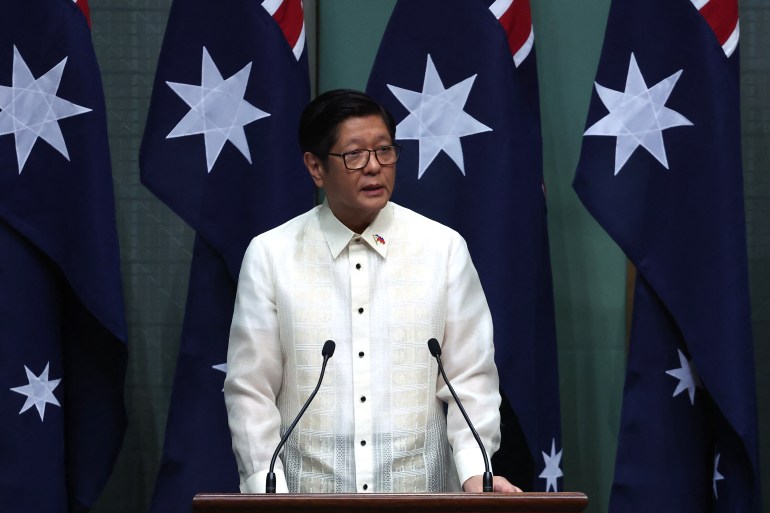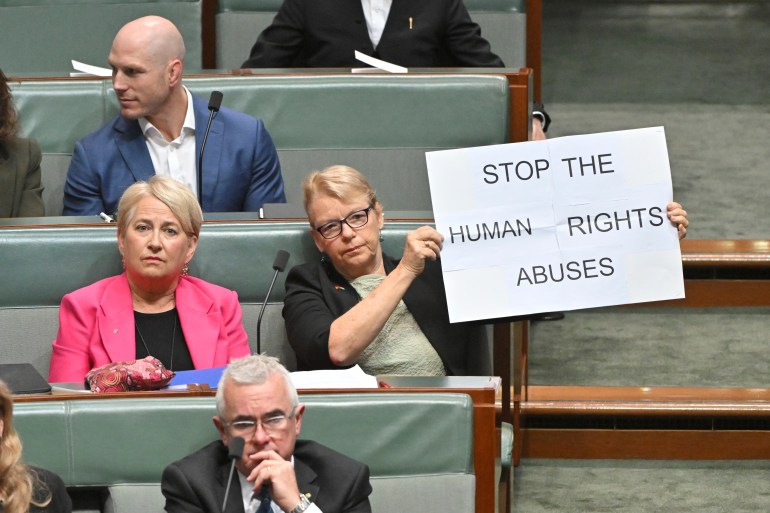Funds come after Philippine president told Australian parliament he would ‘not yield’ a ‘square inch’ in the South China Sea.
Australia’s Foreign Minister Penny Wong has announced 64 million Australian dollars ($41.8m) in funding for maritime security on the first day of a special summit with members of the Association of Southeast Asian Nations (ASEAN) in Melbourne.
“The countries of our region rely on oceans, seas and rivers for livelihoods and commerce, including free and open sea lanes in the South China Sea,” Wong said in her address to a forum on maritime cooperation on Monday morning.
Wong did not specify which countries the funding would go to but “welcomed efforts” by Indonesia, Malaysia, Vietnam and the Philippines to “delimit their maritime boundaries”.
Malaysia, the Philippines and Vietnam claim parts of the South China Sea, which China claims almost in its entirety.
“What happens in the South China Sea, in the Taiwan Strait, in the Mekong subregion, across the Indo-Pacific, affects us all,” Wong said.
The special summit hosted in Melbourne marks 50 years since Australia became a “dialogue partner” of ASEAN, whose members are countries in Southeast Asia, and comes as its members last year held their first-ever joint military drills.
The governing centre-left Labor party has long aimed to forge closer ties with the region, recognising Australia’s proximity to Southeast Asia.
But Australia’s relationship with its regional neighbours and its interests in the South China Sea are also viewed through the lens of Canberra’s close ties with the United States and its membership in the Australia, United Kingdom and US security pact known as AUKUS.
In her speech, Wong quoted Indonesian President Joko Widodo as saying, “We also have the responsibility to lower the tension, to melt the ice, to create space for dialogue, to bridge the differences” in the region.
Indonesia, along with Malaysia, is among Australia’s allies in the region to have raised concerns that Canberra’s investing tens of billions of dollars in nuclear submarines is potentially contributing to a nuclear arms race in Southeast Asia and the wider Asia Pacific.
Philippines ‘will not yield one square inch’
In a speech to Australia’s Parliament last week, Philippine President Ferdinand Marcos Jr was resolute on his countries’ position on the South China Sea amid rising tension with Beijing over their competing claims.
“I will not allow any attempt by any foreign power to take even one square inch of our sovereign territory,” Marcos said.
The Philippines has reported multiple incidents with China in the South China Sea, accusing its coastguard of dangerous manoeuvres and filing diplomatic protests with Beijing over its actions.
“The challenges that we face may be formidable, but equally formidable is our resolve. We will not yield,” he said.

But while some Australian representatives reportedly applauded Marcos’s remarks, at least one member of Australia’s Parliament, Senator Janet Rice, publicly questioned his legacy and was kicked out for holding up a sign saying “Stop the Human Rights Abuses”.
Marcos Jr is the son of former Philippine hardline leader Ferdinand Marcos who was overthrown in a popular uprising in 1986 and fled into exile.

On the streets outside parliament last week, activists held protests on Australia’s apparent lack of scrutiny of its allies’ human rights records, amid ongoing protests over Australia’s support for Israel’s war on Gaza. More protests are planned around this week’s ASEAN summit.
Wong’s speech also included a nod to Australian funding for climate change resilience through the Mekong-Australia partnership, as many Australians, and neighbouring Pacific countries, question increasing militarisation in a time of climate crisis.
https://news.google.com/rss/articles/CBMibWh0dHBzOi8vd3d3LmFsamF6ZWVyYS5jb20vbmV3cy8yMDI0LzMvNC9hdXN0cmFsaWEtZ2l2ZXMtNDFtbi10by1hc2Vhbi1jb3VudHJpZXMtZm9yLWZyZWUtb3Blbi1zb3V0aC1jaGluYS1zZWHSAXFodHRwczovL3d3dy5hbGphemVlcmEuY29tL2FtcC9uZXdzLzIwMjQvMy80L2F1c3RyYWxpYS1naXZlcy00MW1uLXRvLWFzZWFuLWNvdW50cmllcy1mb3ItZnJlZS1vcGVuLXNvdXRoLWNoaW5hLXNlYQ?oc=5
2024-03-04 03:23:56Z
Tidak ada komentar:
Posting Komentar